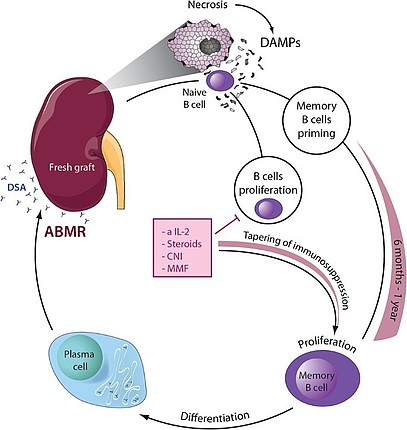Sie befinden sich hier
Inhalt
Over time, patients with chronic kidney disease might develop end-stage renal disease or kidney failure, requiring frequent dialysis and eventually the transplantation of a new kidney. Patients undergoing dialysis often experience serious complications such as severe arterial hypertension, generalized atherosclerosis, severe anemia among others. Yet, there is a worldwide increase in patients in demand for this treatment, some while waiting for transplantation. Due to the shortage of donor organs–especially in Germany there is a massive lack of donor organs–the waiting time for a suitable transplant is often long. To address this, our lab is supporting efforts to improve xenotransplantation as an alternative. In this project, we investigate the transplantation of porcine kidneys to non-human primates and aim to ensure a successful outcome. We help identify potential causes of tissue damage in order to minimize the risk of rejection. For this, we assess the contribution of different mechanisms of regulated necrosis that might contribute to the organ damage or rejection of the transplant.
Specifically, we will investigate the contribution of so-called damage associated molecular patterns (DAMPs) – i.e. intracellular components which are released from cells undergoing necrosis. Solid organ transplants and xenotransplants are generally associated with the release of DAMPs, which can trigger an immune response called necroinflammation. To understand the contribution of necroinflammation to rejection reactions post transplantation, we will use kidneys of modified donor pigs for the xenograft to precisely determine the relative contribution of the individual signaling pathways to the overall organ damage. Ultimately, it will be then possible to specifically block necroptosis, ferroptosis and pyroptosis during organ transplantation to prevent the necroinflammatory cascade in the context of xenotransplantation and thus improve the quality of a xenotransplant.
Relevant publications


